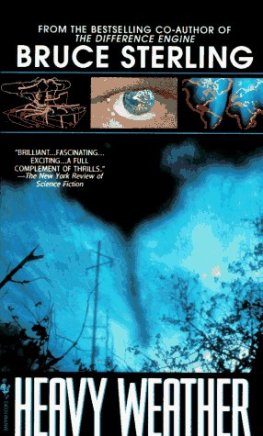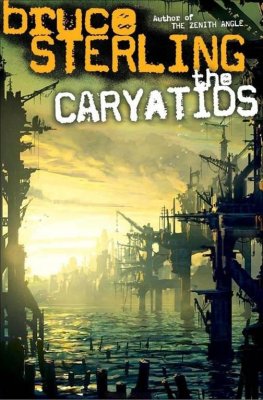Bruce Sterling - The Wonderful Power of Storytelling
Here you can read online Bruce Sterling - The Wonderful Power of Storytelling full text of the book (entire story) in english for free. Download pdf and epub, get meaning, cover and reviews about this ebook. genre: Science fiction. Description of the work, (preface) as well as reviews are available. Best literature library LitArk.com created for fans of good reading and offers a wide selection of genres:
Romance novel
Science fiction
Adventure
Detective
Science
History
Home and family
Prose
Art
Politics
Computer
Non-fiction
Religion
Business
Children
Humor
Choose a favorite category and find really read worthwhile books. Enjoy immersion in the world of imagination, feel the emotions of the characters or learn something new for yourself, make an fascinating discovery.

- Book:The Wonderful Power of Storytelling
- Author:
- Genre:
- Rating:4 / 5
- Favourites:Add to favourites
- Your mark:
- 80
- 1
- 2
- 3
- 4
- 5
The Wonderful Power of Storytelling: summary, description and annotation
We offer to read an annotation, description, summary or preface (depends on what the author of the book "The Wonderful Power of Storytelling" wrote himself). If you haven't found the necessary information about the book — write in the comments, we will try to find it.
The Wonderful Power of Storytelling — read online for free the complete book (whole text) full work
Below is the text of the book, divided by pages. System saving the place of the last page read, allows you to conveniently read the book "The Wonderful Power of Storytelling" online for free, without having to search again every time where you left off. Put a bookmark, and you can go to the page where you finished reading at any time.
Font size:
Interval:
Bookmark:
Bruce Sterling
The Wonderful Power of Storytelling
Game conference speech: "The Wonderful Power of Storytelling"
From the Computer Game Developers Conference, March 1991, San Jose CA
Thank you very much for that introduction. I'd like to thank theconference committee for their hospitality and kindness -- allthe cola you can drink -- and mind you those were genuinetwinkies too, none of those newfangled "Twinkies Lite" we'vebeen seeing too much of lately.
So anyway my name is Bruce Sterling and I'm a science fictionwriter from Austin Texas, and I'm here to deliver my speech now,which I like to call "The Wonderful Power of Storytelling." Ilike to call it that, because I plan to make brutal fun of thatwhole idea... In fact I plan to flame on just any moment now, Iplan to cut loose, I plan to wound and scald tonight.... Becausewhy not, right? I mean, we're all adults, we're allprofessionals here... I mean, professionals in totally differentarts, but you know, I can sense a certain simpatico vibe....
Actually I feel kind of like a mosasaur talking to dolphinshere.... We have a lot in common, we both swim, we both have bigsharp teeth, we both eat fish... But you look like a broadmindedcrowd, so I'm sure you won't mind that I'm basically, like,*reptilian*....
So anyway, you're probably wondering why I'm here tonight, somehopeless dipshit literary author... and when am I going to getstarted on the virtues and merits of the prose medium and itsgoddamned wonderful storytelling. I mean, what else can I talkabout? What the hell do I know about game design? I don't evenknow that the most lucrative target machine today is an IBM PCclone with a 16 bit 8088 running at 5 MHZ. If you start talkingabout depth of play versus presentation, I'm just gonna to stareat you with blank incomprehension....
I'll tell you straight out why I'm here tonight. Why should Ieven try to hide the sordid truth from a crowd thisperspicacious.... You see, six months ago I was in Austria atthis Electronic Arts Festival, which was a situation almost asunlikely as this one, and my wife Nancy and I are sitting therewith William Gibson and Deb Gibson feeling very cool and ratherjetlagged and crispy around the edges, and in walks this*woman.* Out of nowhere. Like J. Random Attractive Redhead,right. And she sits down with her coffeecup right at our table.And we peer at each other's namebadges, right, like, *who isthis person.* And her name is Brenda Laurel.
So what do I say? I say to this total stranger, I say. "Hey. Areyou the Brenda Laurel who did that book on *the art of thecomputer-human interface*? You *are*? Wow, I loved that book."And yes -- that's why I'm here as your guest speaker tonight,ladies and gentleman. It's because I can think fast on my feet.It's because I'm the kind of author who likes to hang out inAdolf Hitler's home town with the High Priestess of Weird.
So ladies and gentlemen unfortunately I can't successfullypretend that I know much about your profession. I mean actuallyI do know a *few* things about your profession.... For instance,I was on the far side of the Great Crash of 1984. I was one ofthe civilian crashees, meaning that was about when I gave uptwitch games. That was when I gave up my Atari 800. As to why myAtari 800 became a boat-anchor I'm still not sure.... It wasquite mysterious when it happened, it was inexplicable, kind oflike the passing of a pestilence or the waning of the moon. If Iunderstood this phenomenon I think I would really have my teethset into something profound and vitally interesting... Like, myAtari still works today, I still own it. Why don't I get it outof its box and fire up a few cartridges? Nothing physicalpreventing me. Just some subtle but intense sense of revulsion.Almost like a Sartrean nausea. Why this should be attached to apiece of computer hardware is difficult to say.
My favorite games nowadays are Sim City, Sim Earth and HiddenAgenda... I had Balance of the Planet on my hard disk, but I wasso stricken with guilt by the digitized photo of the author andhis spouse that I deleted the game, long before I could figureout how to keep everybody on the Earth from starving....Including myself and the author....
I'm especially fond of SimEarth. SimEarth is like a goldfishbowl. I also have the actual goldfish bowl in the *After Dark*Macintosh screen saver, but its charms waned for me, possiblybecause the fish don't drive one another into extinction. Itheorize that this has something to do with a breakdown of theold dichotomy of twitch games versus adventure, you know, arcadezombie versus Mensa pinhead...
I can dimly see a kind of transcendance in electronicentertainment coming with things like SimEarth, they seem like aforeshadowing of what Alvin Toffler called the "intelligentenvironment"... Not "games" in a classic sense, but things thatare just going on in the background somewhere, in an attractiveand elegant fashion, kind of like a pet cat... I think this kindof digital toy might really go somewhere interesting.
What computer entertainment lacks most I think is a sense ofmystery. It's too left-brain.... I think there might be realpromise in game designs that offer less of a sense of nitpickingmastery and control, and more of a sense of sleaziness andbluesiness and smokiness. Not neat tinkertoy puzzles to bedecoded, not "treasure-hunts for assets," but creations withsome deeper sense of genuine artistic mystery.
I don't know if you've seen the work of a guy called WilliamLatham.... I got his work on a demo reel from Media Magic. Inever buy movies on video, but I really live for rawcomputer-graphic demo reels. This William Latham is a heavydude... His tech isn't that impressive, he's got some kind offairly crude IBM mainframe cad-cam program in WinchesterEngland.... The thing that's most immediately striking aboutLatham's computer artworks -- *ghost sculptures* he calls them-- is that the guy really possesses a sense of taste. Fractalart tends to be quite garish. Latham's stuff is very fractallyand organic, it's utterly weird, but at the same time it's veryaccomplished and subtle. There's a quality of ecstasy and dreadto it... there's a sense of genuine enchantment there. A lot ofcomputer games are stuffed to the gunwales with enchanters andwizards and so-called magic, but that kind of sci-fi codmysticism seems very dime-store stuff by comparison with Latham.
I like to imagine the future of computer games as beingsomething like the Steve Jackson Games bust by the SecretService, only in this case what they were busting wouldn't havebeen a mistake, it would have been something actually quiteseriously inexplicable and possibly even a genuine culturalthreat.... Something of the sort may come from virtual reality.I rather imagine something like an LSD backlash occuring there;something along the lines of: "Hey we have something here thatcan really seriously boost your imagination!" "Well, MrDeveloper, I'm afraid we here in the Food Drug and SoftwareAdministration don't really approve of that." That could happen.I think there are some visionary computer police around who areseriously interested in that prospect, they see it as a verypromising growing market for law enforcement, it's kind of theirversion of a golden vaporware.
I now want to talk some about the differences between your artand my art. My art, science fiction writing, is pretty new asliterary arts go, but it labors under the curse of threethousand years of literacy. In some weird sense I'm in directcompetition with Homer and Euripides. I mean, these guys aren'tin the SFWA, but their product is still taking up valuablerack-space. You guys on the other hand get to reinventeverything every time a new platform takes over the field. Thisis your advantage and your glory. This is also your curse. It'sa terrible kind of curse really.
This is a lesson about cultural expression nowadays that hasapplications to everybody. This is part of living in theInformation Society. Here we are in the 90s, we have thesetremendous information-handling, information-producingtechnologies. We think it's really great that we can have groovyunleashed access to all these different kinds of data, we canown books, we can own movies on tape, we can access databanks,we can buy computer-games, records, music, art.... A lot of ourart aspires to the condition of software, our art today wants tobe digital... But our riches of information are in some deep andperverse sense a terrible burden to us. They're like a cognitiveload. As a digitized information-rich culture nowadays, we haveto artificially invent ways to forget stuff. I think this is thereal explanation for the triumph of compact disks.
Font size:
Interval:
Bookmark:
Similar books «The Wonderful Power of Storytelling»
Look at similar books to The Wonderful Power of Storytelling. We have selected literature similar in name and meaning in the hope of providing readers with more options to find new, interesting, not yet read works.
Discussion, reviews of the book The Wonderful Power of Storytelling and just readers' own opinions. Leave your comments, write what you think about the work, its meaning or the main characters. Specify what exactly you liked and what you didn't like, and why you think so.



